Revelation 16:15 - 1-30-2024
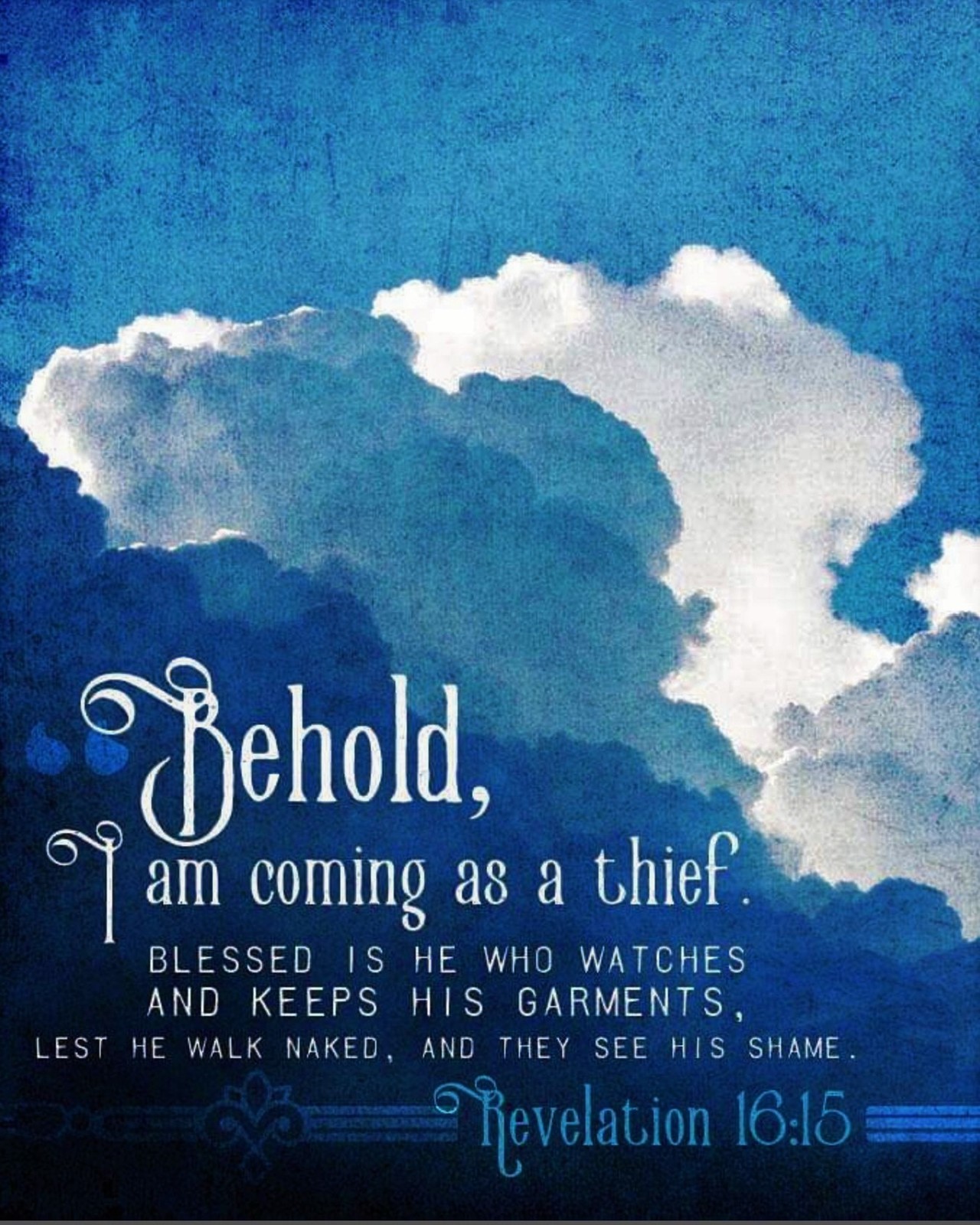

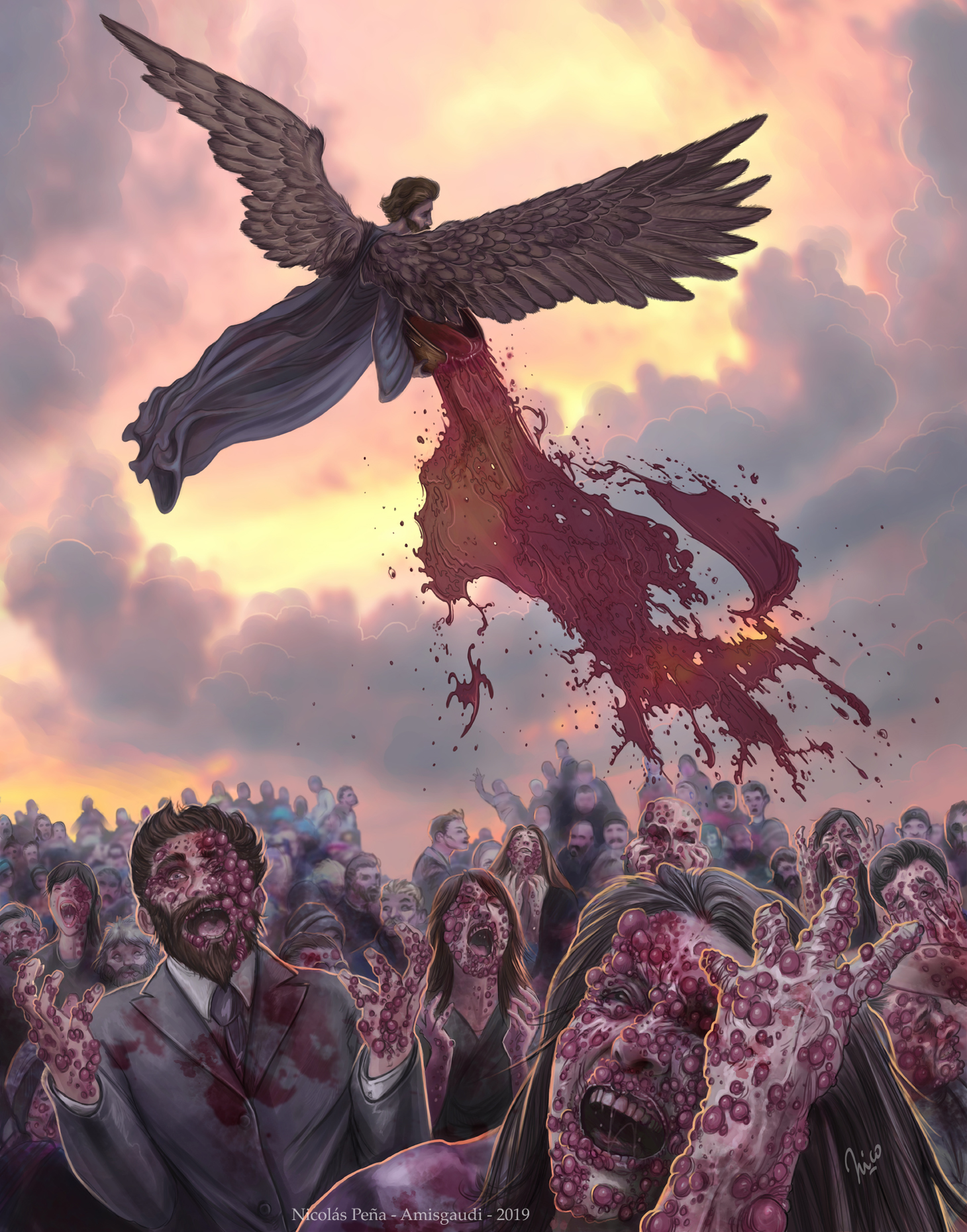
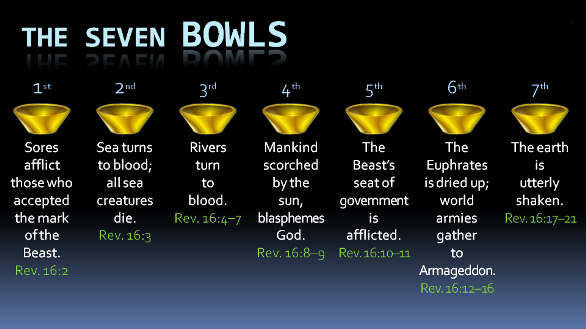


---------------------------------------------------------------------------------------------
Neuralink
Elon Musk's Neuralink implants brain chip in first human
https://finance.yahoo.com/news/neuralink-implants-brain-chip-first-231049603.html
Our Mission
Create a generalized brain interface to restore autonomy to those with unmet medical needs today and unlock human potential tomorrow.
Brain-computer interfaces have the potential to change lives for the better. We want to bring this technology from the lab into peoples' homes.
------------------------------------------------------
Revelation 16
New International Version
The Seven Bowls of God’s Wrath
16 Then I heard a loud voice from the temple saying to the seven angels, “Go, pour out the seven bowls of God’s wrath on the earth.”
2 The first angel went and poured out his bowl on the land, and ugly, festering sores broke out on the people who had the mark of the beast and worshiped its image.
3 The second angel poured out his bowl on the sea, and it turned into blood like that of a dead person, and every living thing in the sea died.
4 The third angel poured out his bowl on the rivers and springs of water, and they became blood. 5 Then I heard the angel in charge of the waters say:
“You are just in these judgments, O Holy One,
you who are and who were;
6 for they have shed the blood of your holy people and your prophets,
and you have given them blood to drink as they deserve.”
7 And I heard the altar respond:
“Yes, Lord God Almighty,
true and just are your judgments.”
8 The fourth angel poured out his bowl on the sun, and the sun was allowed to scorch people with fire. 9 They were seared by the intense heat and they cursed the name of God, who had control over these plagues, but they refused to repent and glorify him.
10 The fifth angel poured out his bowl on the throne of the beast, and its kingdom was plunged into darkness. People gnawed their tongues in agony 11 and cursed the God of heaven because of their pains and their sores, but they refused to repent of what they had done.
12 The sixth angel poured out his bowl on the great river Euphrates, and its water was dried up to prepare the way for the kings from the East. 13 Then I saw three impure spirits that looked like frogs; they came out of the mouth of the dragon, out of the mouth of the beast and out of the mouth of the false prophet. 14 They are demonic spirits that perform signs, and they go out to the kings of the whole world, to gather them for the battle on the great day of God Almighty.
15 “Look, I come like a thief! Blessed is the one who stays awake and remains clothed, so as not to go naked and be shamefully exposed.”
16 Then they gathered the kings together to the place that in Hebrew is called Armageddon.
17 The seventh angel poured out his bowl into the air, and out of the temple came a loud voice from the throne, saying, “It is done!” 18 Then there came flashes of lightning, rumblings, peals of thunder and a severe earthquake. No earthquake like it has ever occurred since mankind has been on earth, so tremendous was the quake. 19 The great city split into three parts, and the cities of the nations collapsed. God remembered Babylon the Great and gave her the cup filled with the wine of the fury of his wrath. 20 Every island fled away and the mountains could not be found. 21 From the sky huge hailstones, each weighing about a hundred pounds,[a] fell on people. And they cursed God on account of the plague of hail, because the plague was so terrible.
Footnotes
- Revelation 16:21 Or about 45 kilograms
--------------------------------------------------------------
OUTLINE:
Dr. J. Vernon McGee
5. Pouring out of the seven mixing bowls of wrath, Chapters 15, 16
a. Preparation for final judgment of the Great Tribulation, Rev 15:1 — Rev 16:1
(1) Tribulation saints in heaven worship God because He is holy and just, Rev 15:1-4
(2) Temple of the tabernacle opened in heaven that seven angels, having seven golden bowls, might proceed forth, Rev 15:5 — Rev 16:1
b. Pouring out of the first bowl, Rev 16:2
c. Pouring out of the second bowl, Rev 16:3
d. Pouring out of the third bowl, Rev 16:4-7
e. Pouring out of the fourth bowl, Rev 16:8, 9
f. Pouring out of the fifth bowl, Rev 16:10, 11
g. Pouring out of the sixth bowl, Rev 16:12
h. Interlude: kings of inhabited earth proceed to Har-Magedon, Rev 16:13-16
i. Pouring out of the seventh bowl, Rev 16:17-21
https://www.blueletterbible.org/Comm/mcgee_j_vernon/notes-outlines/revelation/revelation-outline.cfm
-----------------------------------------------------------------
The word is a Greek transliteration of the Hebrew har məgiddô (הר מגידו). Har means "a mountain or range of hills". This is a shortened form of harar meaning "to loom up; a mountain". Megiddo refers to a fortification made by King Ahab that dominated the Plain of Jezreel. Its name means "place of crowds".
------------------------------------------------------------------------
Ezekiel 38
The Lord’s Great Victory Over the Nations
38 The word of the Lord came to me: 2 “Son of man, set your face against Gog, of the land of Magog, the chief prince of[a] Meshek and Tubal; prophesy against him 3 and say: ‘This is what the Sovereign Lord says: I am against you, Gog, chief prince of[b] Meshek and Tubal. 4 I will turn you around, put hooks in your jaws and bring you out with your whole army—your horses, your horsemen fully armed, and a great horde with large and small shields, all of them brandishing their swords. 5 Persia, Cush[c] and Put will be with them, all with shields and helmets, 6 also Gomer with all its troops, and Beth Togarmah from the far north with all its troops—the many nations with you.
7 “‘Get ready; be prepared, you and all the hordes gathered about you, and take command of them. 8 After many days you will be called to arms. In future years you will invade a land that has recovered from war, whose people were gathered from many nations to the mountains of Israel, which had long been desolate. They had been brought out from the nations, and now all of them live in safety. 9 You and all your troops and the many nations with you will go up, advancing like a storm; you will be like a cloud covering the land.
10 “‘This is what the Sovereign Lord says: On that day thoughts will come into your mind and you will devise an evil scheme. 11 You will say, “I will invade a land of unwalled villages; I will attack a peaceful and unsuspecting people—all of them living without walls and without gates and bars. 12 I will plunder and loot and turn my hand against the resettled ruins and the people gathered from the nations, rich in livestock and goods, living at the center of the land.[d]” 13 Sheba and Dedan and the merchants of Tarshish and all her villages[e] will say to you, “Have you come to plunder? Have you gathered your hordes to loot, to carry off silver and gold, to take away livestock and goods and to seize much plunder?”’
14 “Therefore, son of man, prophesy and say to Gog: ‘This is what the Sovereign Lord says: In that day, when my people Israel are living in safety, will you not take notice of it? 15 You will come from your place in the far north, you and many nations with you, all of them riding on horses, a great horde, a mighty army. 16 You will advance against my people Israel like a cloud that covers the land. In days to come, Gog, I will bring you against my land, so that the nations may know me when I am proved holy through you before their eyes.
17 “‘This is what the Sovereign Lord says: You are the one I spoke of in former days by my servants the prophets of Israel. At that time they prophesied for years that I would bring you against them. 18 This is what will happen in that day: When Gog attacks the land of Israel, my hot anger will be aroused, declares the Sovereign Lord. 19 In my zeal and fiery wrath I declare that at that time there shall be a great earthquake in the land of Israel. 20 The fish in the sea, the birds in the sky, the beasts of the field, every creature that moves along the ground, and all the people on the face of the earth will tremble at my presence. The mountains will be overturned, the cliffs will crumble and every wall will fall to the ground. 21 I will summon a sword against Gog on all my mountains, declares the Sovereign Lord. Every man’s sword will be against his brother. 22 I will execute judgment on him with plague and bloodshed; I will pour down torrents of rain, hailstones and burning sulfur on him and on his troops and on the many nations with him. 23 And so I will show my greatness and my holiness, and I will make myself known in the sight of many nations. Then they will know that I am the Lord.’
Footnotes
- Ezekiel 38:2 Or the prince of Rosh,
- Ezekiel 38:3 Or Gog, prince of Rosh,
- Ezekiel 38:5 That is, the upper Nile region
- Ezekiel 38:12 The Hebrew for this phrase means the navel of the earth.
- Ezekiel 38:13 Or her strong lions
--------------------------------------------------------------------------
Plagues of Egypt
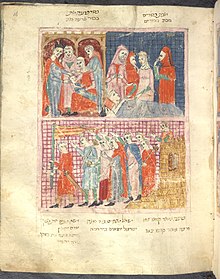
The Plagues of Egypt, in the account of the book of Exodus, are ten disasters inflicted on Biblical Egypt by the God of Israel in order to convince the Pharaoh to emancipate the enslaved Israelites, each of them confronting Pharaoh and one of his Egyptian gods;[1] they serve as "signs and marvels" given by God to answer Pharaoh's taunt that he does not know Yahweh: "The Egyptians shall know that I am the LORD".[2]: 117
Plagues

1. Turning water to blood: Ex. 7:14–24
This is what the LORD says: By this you will know that I am the LORD: With the staff that is in my hands I will strike the water of the Nile, and it will be changed into blood. The fish in the Nile will die, and the river will stink and the Egyptians will not be able to drink its water.
— Exodus 7:17–18
The Bible says that Aaron turned the Nile to blood by striking it with his staff. Pharaoh's magicians used their secret arts to also strike the Nile, creating a second layer of blood. In addition to the Nile, all water that was held in reserve, such as jars, was also transformed into blood. The Egyptians were forced to dig alongside the bank of the Nile, which still had pure water. One week passed before the plague dissipated.
2. Frogs: Ex. 7:25–8:11/15
This is what the great LORD says: Let my people go, so that they may worship me. If you refuse to let them go, I will plague your whole country with frogs. The Nile will teem with frogs. They will come up into your palace and your bedroom and onto your bed, into the houses of your officials and on your people, and into your ovens and kneading troughs. The frogs will go up on you and your people and all your officials.
— Exodus 8:1–4
The Bible says that God ordered frogs to emerge from the Nile, which then jumped around virtually everywhere in Egypt. The magicians attempted to produce frogs from their secret arts, conjuring up a second wave of frogs. Even the private quarters of Pharaoh was infested with frogs. Three days passed before all the frogs died. The Egyptians had to do much work to rid themselves of the corpses, and the land stank of frog for long afterwards. When the decision came for Pharaoh about the slaves, the Lord hardened his heart and Pharaoh decided that the slaves would not be freed.
3. Lice or gnats: Ex. 8:12–15/8:16–19
"And the LORD said [...] Stretch out thy rod, and smite the dust of the land, that it may become lice throughout all the land of Egypt." […] When Aaron stretched out his hand with the rod and struck the dust of the ground, lice came upon men and animals. All the dust throughout the land of Egypt became lice.
— Exodus 8:16–17
4. Wild animals or flies: Ex. 8:16–28/8:20–32
The fourth plague of Egypt was of creatures capable of harming people and livestock. The Bible tells us that the plagues only came against the Egyptians and did not affect the Israelites. Pharaoh asked Moses to remove this plague and promised to grant the Israelites their freedom. However, after the plague was gone, Pharaoh hardened his heart and he refused to keep his promise.
Various sources use either "wild animals" or "flies".[3][4][5][6]
5. Pestilence of livestock: Ex. 9:1–7
This is what the LORD, the God of the Hebrews, says: Let my people go, so that they may worship me. If you refuse to let them go and continue to hold them back, the hand of the LORD will bring a terrible plague on your livestock in the field—on your horses and donkeys and camels and on your cattle and sheep and goats.
— Exodus 9:1–3
6. Boils: Ex. 9:8–12

Then the LORD said to Moses and Aaron, "Take handfuls of soot from a furnace and have Moses toss it into the air in the presence of Pharaoh. It will become fine dust over the whole land of Egypt, and festering boils will break out on men and animals throughout the land."
— Exodus 9:8–9
7. Thunderstorm of hail and fire: Ex. 9:13–35
This is what the LORD, the God of the Hebrews, says: Let my people go, so that they may worship me, or this time I will send the full force of my plagues against you and against your officials and your people, so you may know that there is no one like me in all the earth. For by now I could have stretched out my hand and struck you and your people with a plague that would have wiped you off the earth. But I have raised you up for this very purpose, that I might show you my power and that my name might be proclaimed in all the earth. You still set yourself against my people and will not let them go. Therefore, at this time tomorrow I will send the worst hailstorm that has ever fallen on Egypt, from the day it was founded till now. Give an order now to bring your livestock and everything you have in the field to a place of shelter, because the hail will fall on every man and animal that has not been brought in and is still out in the field, and they will die. […] The LORD sent thunder and hail, and lightning flashed down to the ground. So the LORD rained hail on the land of Egypt; hail fell and lightning flashed back and forth. It was the worst storm in all the land of Egypt since it had become a nation.
— Exodus 9:13–24
8. Locusts: Ex. 10:1–20
This is what the LORD, the God of the Hebrews, says: 'How long will you refuse to humble yourself before me? Let my people go, so that they may worship me. If you refuse to let them go, I will bring locusts into your country tomorrow. They will cover the face of the ground so that it cannot be seen. They will devour what little you have left after the hail, including every tree that is growing in your fields. They will fill your houses and those of all your officials and all the Egyptians—something neither your fathers nor your forefathers have ever seen from the day they settled in this land till now.
— Exodus 10:3–6
9. Three days of darkness: Ex. 10:21–29

Then the LORD said to Moses, "Stretch out your hand toward the sky so that darkness will spread over Egypt—darkness that can be felt." So Moses stretched out his hand toward the sky, and total darkness covered all Egypt for three days. No one could see anyone else or leave his place for three days.
— Exodus 10:21–23
10. Death of the firstborn son: Ex. 11:1–12:36
This is what the LORD says: "About midnight I will go throughout Egypt. Every firstborn son in Egypt will die, from the firstborn son of Pharaoh, who sits on the throne, to the firstborn of the slave girl, who is at her hand mill, and all the firstborn of the cattle as well. There will be loud wailing throughout Egypt—worse than there has ever been or ever will be again."
— Exodus 11:4–6
Before this final plague, God commands Moses to tell the Israelites to mark a lamb's blood above their doors in order that the Angel of Death will pass over them (i.e., that they will not be touched by the death of the firstborn). Pharaoh orders the Israelites to leave, taking whatever they want, and asks Moses to bless him in the name of the Lord. The passage goes on to state that the passover sacrifice recalls the time when the LORD "passed over the houses of the Israelites in Egypt".[7]
Composition and theology
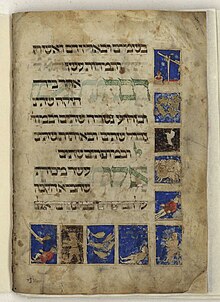
Scholars are in broad agreement that the publication of the Torah took place in the mid-Persian period (the 5th century BCE).[8] The Book of Deuteronomy, composed in stages between the 7th and 6th centuries, mentions the "diseases of Egypt" (Deuteronomy 7:15 and 28:60) but refers to something that afflicted the Israelites, not the Egyptians, and never specifies the plagues.[9][10]
The traditional number of ten plagues is not actually mentioned in Exodus, and other sources differ; Psalms 78 and 105 seem to list only seven or eight plagues and order them differently.[1] It appears that originally there were only seven, to which were added the third, sixth, and ninth, bringing the count to ten.[11]: 83–84
In this final version, the first nine plagues form three triads, each of which God introduces by informing Moses of the main lesson it will teach.[2]: 117 In the first triad, the Egyptians begin to experience the power of God;[2]: 118 in the second, God demonstrates that he is directing events;[2]: 119 and in the third, the incomparability of Yahweh is displayed.[2]: 117 Overall, the plagues are "signs and marvels" given by the God of Israel to answer Pharaoh's taunt that he does not know Yahweh: "The Egyptians shall know that I am the LORD".[2]: 117
Historicity
Scholars broadly agree that the Exodus is not a historical account, that the Israelites originated in Canaan and from the Canaanites and that, while a small group of proto-Israelites may have originated from Egypt, it did not happen in the massive way the Bible describes.[12][13]: 81 [14]: 6–7 The Ipuwer Papyrus, written in the late Twelfth Dynasty of Egypt (c. 1991–1803 BCE),[15] has been put forward in popular literature as confirmation of the biblical account, most notably because of its statement that "the river is blood" and its frequent references to servants running away; however, these arguments ignore the many points on which Ipuwer contradicts Exodus, such as Asiatics arriving in Egypt rather than leaving and the fact that the "river is blood" phrase probably refers to the red sediment colouring the Nile during disastrous floods, or is simply a poetic image of turmoil.[16][17] Attempts to find natural explanations for the plagues (e.g., a volcanic eruption to explain the "darkness" plague) have been dismissed by biblical scholars on the grounds that their pattern, timing, rapid succession, and above all, control by Moses mark them as supernatural.[13]: 90 [2]: 117–118
Artistic representation
Visual art
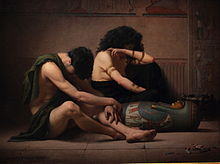
In visual art, the plagues have generally been reserved for works in series, especially engravings. Still, relatively few depictions in art emerged compared to other religious themes until the 19th century, when the plagues became more common subjects, with John Martin and Joseph Turner producing notable canvases. This trend probably reflected a Romantic attraction to landscape and nature painting, for which the plagues were suited, a Gothic attraction to morbid stories, and a rise in Orientalism, wherein exotic Egyptian themes found currency. Given the importance of noble patronage throughout Western art history, the plagues may have found consistent disfavor because the stories emphasize the limits of a
monarch's power, and images of lice, locusts, darkness, and boils were ill-suited for decoration in palaces and churches.[citation needed]
https://en.wikipedia.org/wiki/Plagues_of_Egypt
-------------------------------------------------------------
ChatGPT
Q
Can the bowls of wrath and Armageddon described in Revelation 16 be equated to any kind of nuclear battle being fought?
A
Comments
Post a Comment